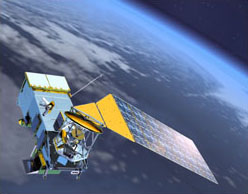Jul 9 2010
National Polar-orbiting Operational Environmental Satellite System (NPOESS) has received the commissioned, infrared sensor for testing and integration on the precursor satellite.

This advanced sensor is designed to offer better weather forecasting all over the globe. The Cross-track Infrared Sounder or CrIS, was developed by ITT Geospatial Systems, Northrop Grumman’s subcontractor, for a spacecraft under NPOESS Preparatory Project (NPP). The sensor is to be launched in 2011, onboard the NPP spacecraft’s first unit. The delivery was received at the Ball Aerospace facility located in Boulder County, Colorado, USA, on 18 June 2010.
The sensors currently under operation in the US are integrated with infrared sounders that provide a 2 to 3 kelvin accuracy in atmospheric temperature profiles and 20 infrared information channels. With CrIS, infrared spectral channels of information are likely to rise to 1,000. The technology will also deliver enhanced horizontal spatial resolution and provide almost one kelvin accuracy in the temperature profile measurement. For the next decade, civil and military operational users will be able to access data of high caliber from the instrument.
According to Northrop Grumman vice president for NPOESS, Linnie Haynesworth, in the initial test conducted on CrIS Flight 1 instrument, the sensor delivered high-end data products, key elements required for effective monitoring of weather and climate.